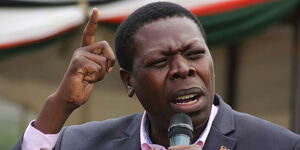The looming strike by Kenya Airports Authority (KAA) workers has escalated tensions, with the threat of industrial action at Jomo Kenyatta International Airport (JKIA) remaining unresolved.
Kenyans.co.ke has learned that a crucial meeting led by Principal Secretary for Transport Mohamed Daghar aimed at defusing the crisis ended without an agreement. This standoff has put the future operations of the region's busiest airport at risk.
The Kenya Airports Workers Union (KAWU) has called for a general meeting on Saturday, August 10, in Embakasi, where they plan to issue directives for the strike. This follows a seven-day strike notice issued earlier, which could see the workers down their tools as early as next week.
KAWU Secretary General Moses Ndiema confirmed the failed meeting, stating, “The workers are resolute. They will not negotiate until their demands are met.”
He further asserted, “If the people we want to resign are sent home, then the PS can now explain the deal to us.”
The crux of the dispute lies in the proposed Ksh246 billion deal to lease JKIA to India’s Adani Airport Holdings Limited. The agreement includes the construction of a new passenger terminal and the refurbishment of existing facilities under a 30-year build-operate-transfer (BOT) contract.
Workers fear this deal could lead to job losses and are demanding the immediate resignation of key KAA officials, including the Acting Managing Director, the General Manager of Engineering, and the General Manager of Human Resource Development.
During the meeting at KAA headquarters, PS Daghar emphasised the benefits of the deal, urging the union to support it.
However, KAWU categorically rejected the proposal, calling for the government to address their concerns first.
“We don’t believe them. We don’t have faith in them at all,” Ndiema told Kenyans.co.ke, reflecting the deep mistrust between the workers and the government.
The discontent stems from the possibility that KAA employees might have to renegotiate their contracts, with the looming threat of job losses if Adani Airport Holdings wins the bid to manage JKIA.
This prospect has angered the workers, who issued an ultimatum for the government to clarify its stance on the deal.
Adding to the tension, the government and KAA face a lawsuit over the proposed deal.
Issack Lango Guyo has challenged the $1.85 billion agreement, claiming it was rushed and bypassed usual procedures. The suit seeks to have the deal declared unconstitutional, further complicating the situation.
This situation has sparked fears of severe disruptions at JKIA, a vital hub for both domestic and international travel. The airport’s smooth operation is crucial for Kenya’s economy, and a strike could have significant repercussions. Kenyans are bracing for the potential chaos, with many expressing frustration over the government’s handling of the issue.
Union leaders remain firm in their stance, calling for solidarity among the workers. The upcoming general meeting in Embakasi is expected to solidify its plans for industrial action unless the government meets its demands. As a result, the pressure mounts on the government to find a resolution that addresses the workers' concerns while ensuring the continued operation of JKIA.
The broader implications of this standoff extend beyond the immediate conflict. The handling of the JKIA lease deal has raised questions about transparency and the government’s commitment to protecting workers’ rights. The outcome of this dispute could set a precedent for future dealings between state agencies and private investors.












